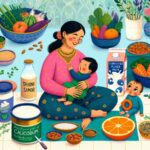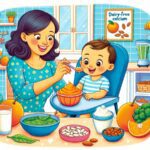Finding the right Dairy alternatives for toddlers with lactose intolerance can be a pivotal step in managing their dietary needs while ensuring they receive all the essential nutrients for their growth and development. Lactose intolerance in toddlers can present various challenges, but with the right knowledge and alternatives, parents can ensure their little ones thrive without the discomfort associated with dairy products.
Understanding Lactose Intolerance in Toddlers
Lactose intolerance occurs when the body lacks enough lactase, the enzyme required to digest lactose found in milk and other dairy products. This condition can lead to discomforts such as bloating, diarrhea, and gas after consuming dairy. Recognizing the signs early can help parents and caregivers manage symptoms effectively.
For comprehensive insights into lactose intolerance symptoms and management strategies, consider visiting Lactose Intolerance in Infants: Signs and Solutions.
Dairy Alternatives for Toddlers with Lactose Intolerance
When it comes to Dairy alternatives for toddlers with lactose intolerance, the aim is to find nutrient-rich options that can replace the vitamins and minerals found in cow’s milk. Alternatives such as almond milk, soy milk, and oat milk not only offer variety but also come enriched with calcium and vitamin D, ensuring toddlers receive their daily nutritional requirements.
It’s essential to choose fortified options and consult with a pediatric nutritionist to ensure these alternatives meet your toddler’s specific dietary needs. For guiding principles on introducing dairy alternatives and ensuring balanced nutrition, reading about Vegan Baby Nutrition Plan for the First Year can offer valuable insights.
Nutritional Considerations and Supplement Needs
Beyond simply replacing dairy with alternatives, it’s crucial to address the broader nutritional profile required for a growing toddler. Calcium, vitamin D, protein, and fats are essential for development, and parents must ensure these needs are met through a combination of food sources and possibly supplements.
Understanding the importance of these nutrients and identifying rich sources can empower parents to create a well-rounded, dairy-free diet for their toddlers. For detailed information on calcium sources for dairy-free toddlers, the article Calcium Sources for Dairy-Free Toddlers is an excellent resource.
In conclusion, while managing Dairy alternatives for toddlers with lactose intolerance may seem daunting initially, a wealth of nutritious, delicious, and toddler-friendly options are available. By carefully selecting alternatives, consulting with healthcare professionals, and focusing on a balanced diet, parents can ensure their toddlers thrive without dairy. For more insights on dietary management and toddler nutrition, exploring articles within our internal link library can provide comprehensive guidance and support.













